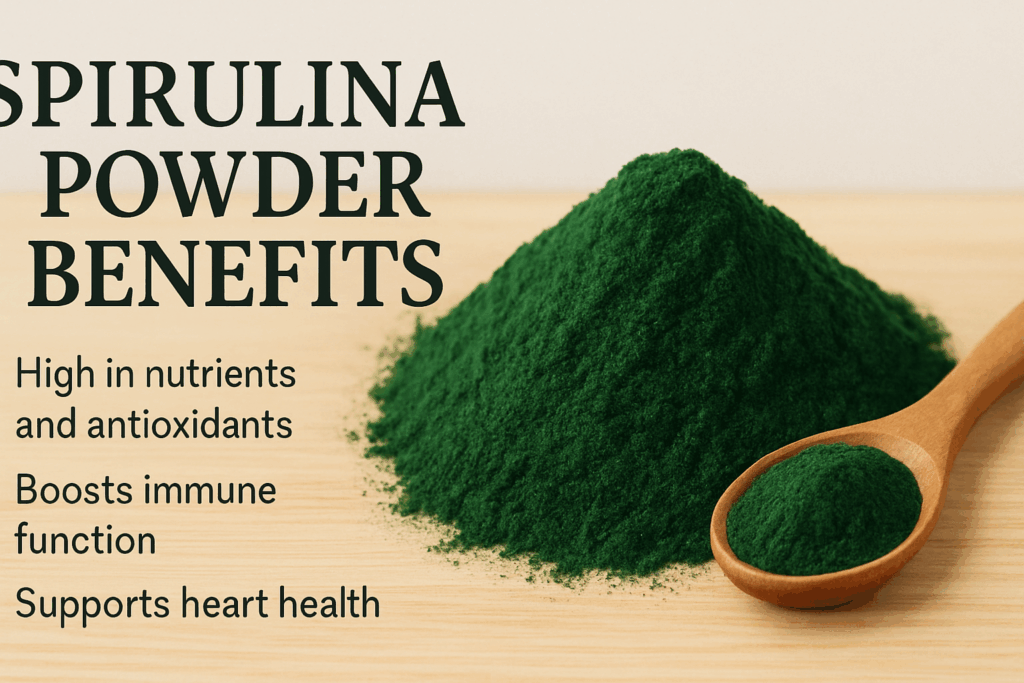Spirulina Powder Benefits
Spirulina Powder
Spirulina powder has been making waves in the health and wellness world—and for good reason. Packed with a potent blend of nutrients, this deep blue-green superfood has been praised for its ability to boost energy, improve immunity, and support overall health. While it might sound like the latest trend, spirulina has a long history, dating back to the diets of ancient civilisations.
What Is Spirulina Powder?
Spirulina is a type of blue-green algae that grows in highly alkaline water environments. When harvested and dried, it’s ground into a fine, vibrant green powder that’s incredibly nutrient-dense. This powder is easy to mix into smoothies, juices, or even baked goods, making it an accessible way to boost your diet.
A Brief History of Spirulina in Nutrition
Historically, spirulina was consumed by the Aztecs and other ancient cultures as a staple source of protein and nutrition. In recent decades, NASA has even considered spirulina as a dietary supplement for astronauts due to its compact yet rich nutritional profile.
Nutritional Profile of Spirulina Powder
Essential Vitamins and Minerals
Spirulina is rich in B vitamins (especially B1, B2, and B3), iron, calcium, magnesium, potassium, and zinc. It’s also one of the few plant-based sources of bioavailable vitamin B12, making it ideal for vegetarians and vegans.
Amino Acids and Protein Content
Spirulina contains all nine essential amino acids, making it a complete protein source. With a usual 60–70% protein by weight, it’s more protein-dense than most meats.
Antioxidants and Phytonutrients
The pigment phycocyanin, which gives spirulina its blue-green colour, is a powerful antioxidant and anti-inflammatory compound. Spirulina also contains beta-carotene, chlorophyll, and other phytonutrients that protect cells from damage.
Top 15 Spirulina Powder Benefits for Health
1. Supports Immune System Function
The antioxidants in spirulina help strengthen immune defences and fight off infections.
2. Enhances Energy Levels and Reduces Fatigue
Its high nutrient density provides a natural energy boost without the use of caffeine.
3. Promotes Healthy Weight Management
Spirulina may help regulate appetite and enhance metabolism, supporting weight loss efforts.
4. Improves Gut Health and Digestion
Its prebiotic properties promote the growth of healthy gut bacteria.
5. Supports Heart and Cardiovascular Health
Regular spirulina intake may lower LDL cholesterol and improve arterial health.
6. Helps Regulate Blood Sugar Levels
Some studies suggest spirulina can help stabilise glucose levels.
7. Boosts Detoxification and Liver Function
Chlorophyll helps remove toxins and heavy metals from the body.
8. Promotes Healthy Skin and Anti-Aging
Its antioxidants protect skin cells from damage, slowing signs of aging.
9. Supports Eye Health and Vision
Rich in carotenoids, spirulina promotes optimal eye function.
10. May Reduce Allergy Symptoms
Its anti-inflammatory effects can reduce nasal congestion and sneezing.
11. Improves Muscle Strength and Endurance
Athletes often use spirulina to enhance their performance and recovery.
12. Supports Mental Clarity and Brain Health
Spirulina’s nutrients improve oxygen supply.
13. Reduces Inflammation in the body
Helps manage chronic inflammation linked to various diseases.
14. Strengthens Bone and Joint Health
Its minerals support bone density and joint flexibility.
15. Helps Combat Anemia and Iron Deficiency
Spirulina’s iron content is highly absorbable, which helps reduce anemia symptoms.
How to Use Spirulina Powder for Maximum Benefits
Recommended Dosage and Safety Tips
Most experts recommend starting with 1–3 grams daily and gradually increasing to 5–10 grams per day.
Best Ways to Add Spirulina Powder to Your Diet
- Blend into smoothies or juices
- Stir into yogurt or oatmeal
- Mix with salad dressings
- Add to energy balls or bars
Potential Side Effects and Precautions
While generally safe, spirulina may have some side effects and may cause mild digestive discomfort in some people. It mostly happens at the beginning, when the body is just starting to consume spirulina, as it gets used to taking spirulina with its high levels of fibre. Once the body becomes accustomed to the new food, digestive discomforts typically subside. Those with autoimmune diseases or phenylketonuria (PKU) should consult a doctor before use.
Choosing High-Quality Spirulina Powder
Looking into the cleanliness of the environment where the spirulina was cultivated is key. Organic land certification, third-party lab testing, and transparency regarding origin are key factors to consider, which will ensure you receive Fresh Spirulina Pure Powder.
FAQs on Spirulina Powder Benefits
Q1: Can I take spirulina every day?
Yes, daily use is safe for most healthy individuals.
Q2: Is spirulina suitable for children?
In small doses, yes, but consult a pediatrician first.
Q3: Can spirulina replace multivitamins?
It’s nutrient-rich but should complement, not replace, a balanced diet.
Q4: Does spirulina taste bad?
It has an earthy, slightly seaweed-like flavour, but blending it with fruit masks the taste.
Q5: Is spirulina vegan?
Yes, it’s 100% plant-based.
Q6: Can spirulina help with hair growth?
Its protein and minerals may support stronger, healthier hair.
Why Spirulina Powder Deserves a Place in Your Diet
From immune support to glowing skin, spirulina powder offers a powerhouse of benefits that make it a must-have in any wellness routine. With consistent use, it can help you feel more energised, focused, and healthy, naturally.
